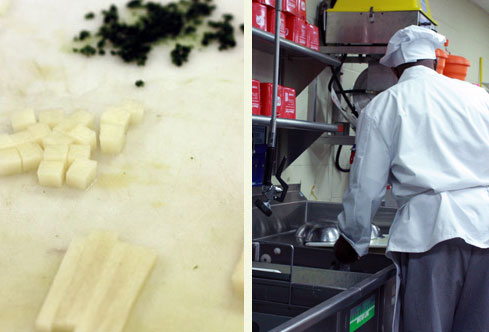I’m two weeks away from finishing my first term at Midwest Culinary Institute. I’ve learned knife skills, cooked eggs, confronted vegetables and wrestled potatoes. But I’ve also learned a few things about surviving in a teaching kitchen. Well, actually I’ve learned ten things.
- where to buy prednisone 5mg I always thought a good chef was a good cook. Now I know that a good chef is an effective multi-tasker. Yes, it’s important to be creative. But for now, I concentrate on not setting the potatoes on fire. The fastest way to feel like a culinary misfit is to forget the anna potatoes in oven #1 while browning the scallop potatoes in oven #2. (Note: someone’s quiche did not fair so well in the combination oven. Forgetting is easy to do.)
- Presidente Dutra Cooking is a little painful. 20 minutes over a red-hot commercial range is all it takes to turn beet red and start sweating. When constantly flipping contents of a sauté pan, your wrist starts to ache too. Now imagine line cooks who do it all day long.
- There is inexplicable loyalty in the kitchen. Kinship in the kitchen occurs because your classmate grabs you a potato out of the bin when you forget one. You return this favor by rescuing their burning dish in the oven. This is the brotherhood that Anthony Bourdain writes about so frequently and I’m happy to report that it’s true and it extends to the females too.
- The most successful cooks are the most confident ones. If you think for one second that you can’t do it, you’re more prone to screwing up. I’ve seen most people rise to challenges in the kitchen but some don’t. Just put your head down and go.
- You’ll do other people’s work. Yes, there’s that aspect in the kitchen too. There are folks who will line up their dirty dishes in the back and wait for someone else to take care of them. We’re not allowed to go home until everything is spotless, so doing other people’s work sometimes expedites this process.
- Master the basics. Knife skills are finicky but if you don’t figure them out you’re going to have problems. Spend extra time learning how to cut properly because you’ll be graded on this skill in every dish you complete for the remainder of your training. It’s not as cool as learning how to flambé but it’s a lot more useful.
- You should always bring potatoes to a boil in cold water. This is a simple fact that somehow escaped me all the years I cooked at home. My mom was happy to tell me she’s known this trick for years.
- If you’re ordering vegetables in a restaurant, they’re probably not healthy. Unless specified, they’re likely cooked in butter and sugar and if they’re especially tasty, they’re cooked in a lot of butter and sugar. I may have been happier not knowing this kitchen truth but at least I now know why sliced carrots taste so good.
- No matter what, push ahead. Everyone’s got their reasons for being tired. Most of my classmates work full time and go to school at night. Some of them have kids to take care of when they get home. There’s still no better feeling than finishing the night knowing that you did your best. Burns, cuts, scars and all.
- There’s always tomorrow to get better. I’ve still got some tricks up my sleeve. I believe quite firmly that my greatest masterpiece is still ahead.





{ 3 comments… read them below or add one }
Those are great especially the one about that cooking hurts a little. It’s true it does hurt but I have to say that the sharp knives and the raging flames is what attracted me to cooking and being a chef in the first place. Good Job!!!!
#4 will carry over into everything you ever do in life.
Fake it until you make it.
Once again, I’m loving your culinary school posts. Especially since it’s all taking place at my school!